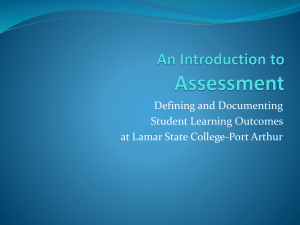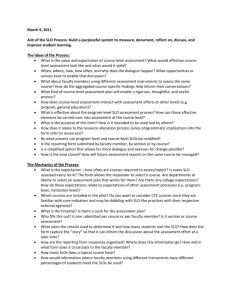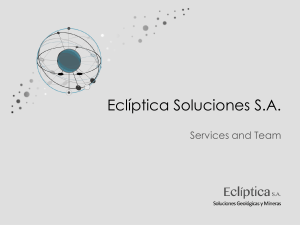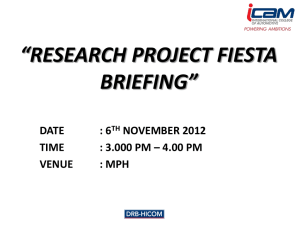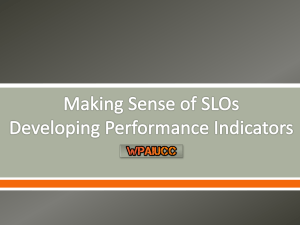Creative Writing PSLO - Orange Coast College
advertisement
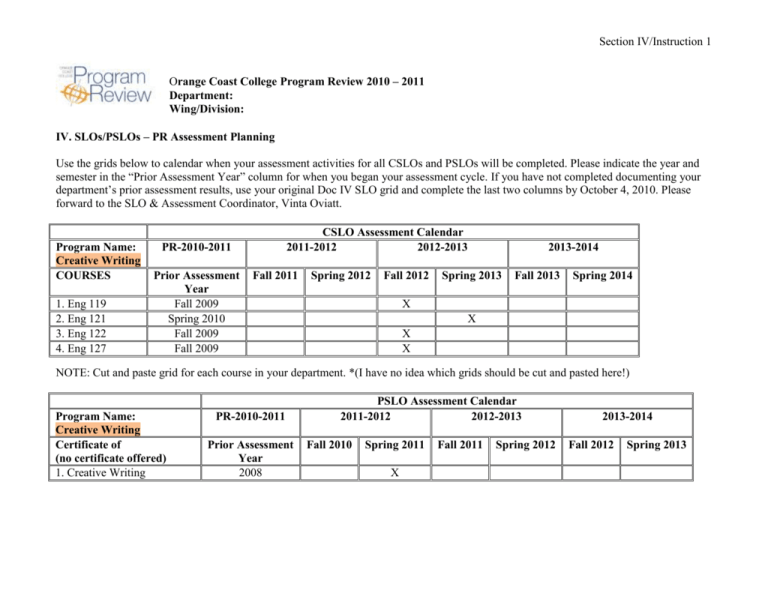
Section IV/Instruction 1 Orange Coast College Program Review 2010 – 2011 Department: Wing/Division: IV. SLOs/PSLOs – PR Assessment Planning Use the grids below to calendar when your assessment activities for all CSLOs and PSLOs will be completed. Please indicate the year and semester in the “Prior Assessment Year” column for when you began your assessment cycle. If you have not completed documenting your department’s prior assessment results, use your original Doc IV SLO grid and complete the last two columns by October 4, 2010. Please forward to the SLO & Assessment Coordinator, Vinta Oviatt. Program Name: Creative Writing COURSES 1. Eng 119 2. Eng 121 3. Eng 122 4. Eng 127 CSLO Assessment Calendar 2011-2012 2012-2013 PR-2010-2011 Prior Assessment Year Fall 2009 Spring 2010 Fall 2009 Fall 2009 Fall 2011 Spring 2012 Fall 2012 2013-2014 Spring 2013 Fall 2013 Spring 2014 X X X X NOTE: Cut and paste grid for each course in your department. *(I have no idea which grids should be cut and pasted here!) Program Name: Creative Writing Certificate of (no certificate offered) 1. Creative Writing PR-2010-2011 Prior Assessment Year 2008 PSLO Assessment Calendar 2011-2012 2012-2013 Fall 2010 Spring 2011 X Fall 2011 Spring 2012 2013-2014 Fall 2012 Spring 2013 Section IV/Instruction 2 Orange Coast College Program Review 2010 – 2011 Department: English—Creative Writing Wing/Division: Literature & Languages IV. Learning Results from Assessment Please recap all of your program’s SLO activities, including courses/programs assessed and those not assessed. We did not assess Eng 126 (Poetry) or Eng 131 (Writing Reviews) because they have not been offered for several years. The remaining courses (Eng 119, 121, 122, and 127) were all assessed in the 2009-2010 academic year. A. How well are they learning? (& Analysis of the data & department dialogue) 1. Summarize the results of Student Learning Outcomes assessment (based on 2009-2010 SLO Assessments): Student success ranges between 73% -84%, depending on the complexity of the skill. 2. Based on the results from all the criteria used, did your program achieve its standards for success? Yes/No Yes, we were very pleased with the results. 3. What did your findings show you/your faculty as well as the significance of these findings for your program? Our findings demonstrate that students are acquiring the skills we are teaching at a reasonably high rate of success. B. Now What? (PLAN TO IMPROVE OUR PROGRAM) Describe each change proposed or in progress to improve your program. Include specifically how the change ties to the results/is based on the results from the assessment & how it will contribute to the improvement of the program. Include completion/effective dates. *Please note: these are the proposals we advanced in the 2008 Program Review: Reinstate the Fall section of Eng 121 (Short Story Workshop). Because this class is often repeated by students up to four times, offering a section each semester will draw more students from the community, increase retention, and improve the writing skills of our students. Institutionalize compensation for the faculty advisor/editor of the Orange Coast Review. The Orange Coast Review offers an invaluable opportunity for student writers and artists to publish their work. It also raises the prestige of Orange Coast College within the community, among writers and artists, and at other colleges and universities. However, editing the journal demands roughly 400 hours per year of faculty time. Compensating the editor or offering reassign time would help keep the journal alive so that we can reap the benefits outlined above. Reinstate one section per year of English 127 (Script writing), two sections if demand is sufficient. Eng 127 is a very popular class, one that consistently overfills by roughly 30%-40%. The class filled when we offered more sections and would fill again if the cut sections were reinstated. This course is highly valued by students and by the community alike. None of these goals have been met due to the budget crisis, but when the economy picks up we hope to implement them. Section IV/Instruction 3 C. REFLECTION ON ASSESSMENT PROCESS 1. List strengths of assessment process. a. b. 2. List what you would like to see improved in your existing assessment process. a. b. Section IV/Instruction 4 Note: Please use your partially filled-in form (first three columns) to complete the final two columns before beginning a new cycle. Orange Coast College Program Review 2010 – 2011 Department: Wing/Division: Program Name: Creative Writing_______________________________ Program Lead: ___D. Loren_____________________________ Type of Outcome: CSLO ________________________ PSLO _X______________________ (please check type of outcome) (Identify Course) (Identify Program) Institutional Student Learning Outcomes: Communication; Thinking Skills; Global Awareness; Personal Development & Responsibility Program Mission Statement Intended Outcomes The OCC English Department’s mission is to foster academic literacy by enabling students to become effective writers, readers, and critical thinkers— ultimately What will students be able to think, know, do, or feel because of a given educational experience in a course or a program? List all SLOs/PSLOs Which ISLO is outcome linked to? Means of Assessment & Criteria for Success What are the specific assessment tools that will establish the degree & extent of what is to be achieved? What is the criterion for success? Analysis of Data Collected Use of Results (To be completed after assessment of SLOs) Include any resources on Doc. V (To be completed after assessment of SLOs) Summarize findings vis-à-vis outcomes, means of assessment, & criteria for success. Include your process for determining who participated in the assessment and the sample size. What do the data tell us about program improvement: What, if anything, do we need to do at the program or course level to improve student learning or service? What resources are necessary? What do the data tell us about your process in terms of goals, outcomes, and means of assessment, defined criteria for success, implementation process, and data collection? Section IV/Instruction 5 preparing them to communicate fluently across the curriculum and in their professional and daily lives. We also seek to guide students in their pursuit of an Associate Degree and/or transfer to the university level. These goals are met through our extensive offerings, including courses in Basic Skills and Developmental Writing, Composition, Critical Thinking, Literature, and Creative Writing. SLO #1 SLO #2



